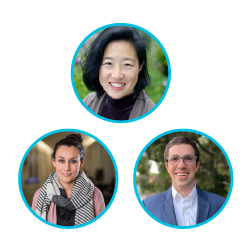STEM21 Featured Speakers & Panelists
This year’s STEM21 includes an all-star lineup of featured speakers from across the country. No matter what day you are registered, all keynote presentations are available to all STEM21 attendees.
Keynote Speakers
Monday, July 26 • 10:30–11:30 AM EDT
A Morning with Kate Biberdorf
Dr. Kate Biberdorf
Professor of Chemistry at The University of Texas at Austin
As seen on the Today Show and The Late Show with Stephen Colbert, Dr. Kate Biberdorf is breaking stereotypes and blowing stuff up—all in a good pair of heels. Through her theatrical and hands-on approach to teaching, Dr. Biberdorf is breaking down the image of the stereotypical scientist, while reaching students that might otherwise be intimidated by science. Drawing forth emotional responses, rather than rote recitation of facts is key to Biberdorf ’s dynamic approach to her program, as well as to science in general. Her exciting and engaging program leaves audiences with a positive, memorable impression of science—all while diminishing the stigma around women in science. Dr. Biberdorf is the author of Kate the Chemist: The Big Book of Experiments, a collection of 25 kid-friendly science experiments that come prepared with a messiness factor rating and a note from Kate about how each experiment works. Her newest book, Dragons vs. Unicorns, is a children's novel and was released in March 2020.
Dr. Kate Biberdorf
Dr. Kate Biberdorf is a scientist, a science entertainer, and a professor at The University of Texas at Austin. Through her theatrical and hands-on approach to teaching, Dr. Biberdorf is breaking down the image of the stereotypical scientist, while reaching students who might otherwise be intimidated by science. Students' emotional responses, rather than rote memorization of facts, are key to Biberdorf's dynamic approach to her program, as well as science in general. Her exciting and engaging program leaves audiences with a positive, memorable impression of science—all while diminishing the stigma around women in science. She has appeared on The Today Show, The Kelly Clarkson Show, NBC Nightly News, The Wendy Williams Show, and The Late Show with Stephen Colbert.
She is also the author of Kate The Chemist: The Big Book of Experiments, a full-color nonfiction book featuring 25 fun, kid-friendly experiments kids can do in their own kitchens. Readers will learn how to make slime, fake tattoos, edible snot, glitter volcanoes, and more—all with the help of step-by-step instructions, ingredient lists, stunning photographs, a messiness factor rating, safety reminders, and a note from Kate about how each fun-tastic experiment works!
She is also the author of the Kate the Chemist fiction series, which features a 10-year-old Kate, along with her friends and little brother Liam, solving problems in her community with the help of science! This series shows kids that science truly is everywhere.
In addition to the fiction series, the soon-to-be-released Dr. Kate Biberdorf's It’s Elemental: The Hidden Chemistry In Everything is about the ways we experience chemistry in everyday life.
Dr. Biberdorf lives in Austin, Texas, with her husband and two dogs (and one very grumpy cat.)
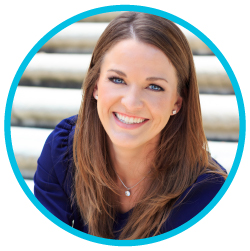
Monday, July 26 • 2:45–3:30 PM EDT
Tools @ Tea Time with Tim & Rob
Tim Blesse
Teacher Programs Consultant, Denver Museum of Nature & Science
Robert Payo
Director of K–12 Education, Denver Urban Gardens
Tim and Rob are back for tea and lively conversation as we look toward next year, once again reflecting on our use of technology in the classroom. We'll look at one of the big questions on all our minds: Now that we know what we know, how can we use that to support students in both their learning and their emotional well-being as we move back into the "new normal" classroom?
Tim Blesse
Tim Blesse is the Teacher Programs Consultant at the Denver Museum of Nature & Science. A classroom science teacher for over 31 years, he now facilitates professional development workshops and courses, both in-person and online. He is privileged to work with amazing teachers and education leaders in Colorado and throughout the country.
Robert Payo
Robert Payo is director of K–12 Education for Denver Urban Gardens and a regular facilitator for teacher professional learning for NSTA and other national organizations through his current work and former work with the Denver Museum of Nature & Science and the National Science Digital Library.
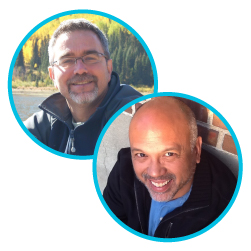
Tuesday, July 27 • 10:30–11:30 AM EDT
Building Resilience in Science Students
Jami Valentine Miller, PhD
Founder, African American Women in Physics, Inc.; and Primary Patent Examiner, U.S. Patent and Trademark Office
In this talk Jami will discuss strategies that can be used to build resilience, with a particular emphasis on increasing the percentage of women and underrepresented minorities that choose to pursue STEM studies. She will use examples from her experiences as one of the few African American women with a PhD in physics and discuss strategies to improve diversity, equity, and inclusion efforts in STEM.
Jami Valentine Miller, PhD
Dr. Jami Valentine Miller was the first African American woman to earn a PhD in physics from the Johns Hopkins University where she studied the physics behind spintronic materials and devices. She earned a bachelor’s in physics from Florida A&M University and a master’s in physics from Brown University. She joined the U.S. Patent and Trademark Office where she examines semiconductor patent applications for phase-change memory, nanoscale memory, and spintronic devices. Dr. Miller is the founder of African American Women in Physics, Inc. (AAWIP), an organization dedicated to honoring the women who paved the way, inspiring future physicists, and connecting with people interested in promoting diversity and inclusion in STEM. She enjoys spending her free time as a motivational STEM speaker and is the current Diversity Chair for American Mensa.
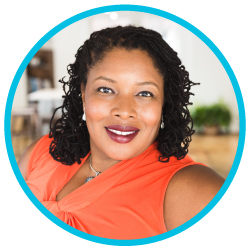
Wednesday, July 28 • 10:30–11:30 AM EDT
From Students to STEM Teachers!
John Arthur
2021 Utah Teacher of the Year and a Top 4 Finalist for National Teacher of the Year
If a student in your class is amazing at math or a wiz in the science lab, what job do you tell them they'd be good at? I think the answer we need to tell them is, “You would be a great teacher!” Students should leave our classes loving STEM and wanting to TEACH STEM! In this conversation, we will explore ways teachers can pass on both our love for STEM and our passion for our profession to our students.
John Arthur
John Arthur is the 2021 Utah Teacher of the Year and a Top 4 Finalist for National Teacher of the Year. He teaches sixth grade at Meadowlark Elementary, a Title I school in Salt Lake City. John is also an adjunct professor in the Graduate School of Education at Westminster College, and he represents the Asian community on the Utah State Board of Education’s Advisory Committee on Equity of Educational Services for Students (ACEESS).
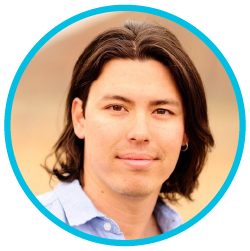
Thursday, July 29 • 10:30–11:30 AM EDT
Blankets Cover, Teachers Transform: Centering Justice in Science Curriculum
Daniel Morales-Doyle, PhD
Assistant Professor of Science Education, Department of Curriculum and Instruction, University of Illinois Chicago
As science educators, what contributions can the disciplines we teach make to ongoing struggles for social and environmental justice? This presentation explains how keeping this question at the center of our work provides opportunities for our students to engage with our disciplines in deeper, more critical, and potentially transformative ways.
Daniel Morales-Doyle, PhD
Daniel Morales-Doyle is an assistant professor of science education in the department of curriculum and instruction at the University of Illinois at Chicago. His research examines the potential for science education to act as a catalyst for social transformation by engaging youth in learning to do science and to critique science with and for just, sustainable communities. This work includes studying high school science curricula, teaching, and teacher education as situated within broader contexts of inequity. Daniel was a high school teacher in the Chicago Public Schools for more than a decade before joining the faculty at UIC.
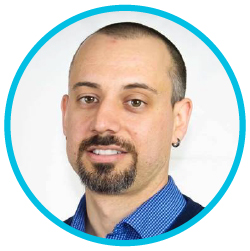
Wednesday, July 28 • 2:45–3:30 PM EDT
Simulations in the Science Classroom
Moderator: Scott Buhr
Science Teacher, Hillcrest High School, Greenville, SC
Simulations have long been in the instructional tool box of the science educator. With the rise of online and hybrid offerings, simulations of the real world play an increasingly important role for science students all around the globe. You will not want to miss this keynote panel hosted by highly accomplished teachers with a wide variety of experiences. The guided discussion will focus on how simulations are implemented in the classroom to maximize their instructional impact and drive inquiry.
Scott Buhr
Dr. Scott Buhr has taught science at Hillcrest High School in Greenville, SC, for nearly a decade. He has demonstrated educational leadership in his school and community by chairing a local chapter of the School Improvement Council; offering local, district, statewide, regional, national, and international professional development; serving as an AP Physics Reader; and innovating unique science engagement opportunities such as leading his class to break a world record for the highest launch from a Galilean Cannon. Scott was recently named a South Carolina finalist for the Presidential Award for Excellence in Mathematics and Science Teaching. He is currently in a transition to higher education as an assistant professor at Bob Jones University where he will chair the division of teacher education and continue his STEM work by offering courses that help students integrate technology into the classroom. Recreationally, Scott enjoys time on South Carolina’s oceans and lakes with his wife Kate, a Spanish teacher, and five-year-old son, Elliot. Dr. Buhr is proud to support NSTA and its efforts to enhance and improve science education across the country.
LaShundra Young
LaShundra Young has taught science at Germantown High School in Madison, MS, for eight years. LaShundra received a BS in Biological Science from Mississippi College in 2004. She also acquired additional science master's level studies from Jackson State University (Microbiology 2004–2006) and she’s a 2011 graduate of the University of Phoenix (M.A.T./Secondary Education). LaShundra became a National Board Certified Teacher in Science/ Adolescence & Young Adulthood in December 2019. She received the Germantown Key of Excellence in Math & Science award for 2014–2015, STAR Teacher award for 2016–2017, GHS Teacher of the Year 2017–2018, the Presidential Award of Excellence In Math & Science in 2020. LaShundra is certified through College Board in AP Biology and AP Chemistry and in laboratory safety through Flinn Scientific.
Kathleen Scalise
Kathleen Scalise is a professor at the University of Oregon in the Department of Methodology, Policy, and Leadership. Dr. Scalise has extensive research in the areas of learning, e-learning, large-scale assessment, and instructional technology in the context of STEM education (science, technology, engineering, and mathematics) and also in emergent language, second language acquisition, digital literacy, social collaboration, leadership, and 21st-century skills. She currently serves as director of the National Assessment of Educational Progress (NAEP) Science for ETS. She is co-lead for the University of Oregon Social Systems Data Science Network. Dr. Scalise has extensive journal publications and served on the NRC committee report on assessment of the Next Generation Science Standards. She holds K–12 teaching credentials (California) for physical sciences and life sciences, a BA in biochemistry, and a PhD focusing on Quantitative Measurement from UC Berkeley.
Vaughn Vick
Vaughn Vick has been teaching science for 18 years and currently teaches AP and IB Physics at Christ Church Episcopal School in Greenville, SC. She is an AP Reader (grader) and serves as a Question Leader at the AP reading. Vaughn also writes questions for the AP exams and has co-authored two review guides, Fast Track to a 5, for the AP Physics exams. Vaughn received her EdD in Curriculum and Instruction from the University of South Carolina. Her proudest accomplishment is being mom to 10-year-old Duncan.
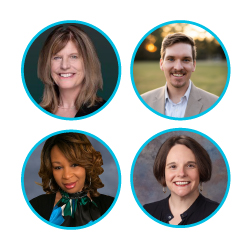
Friday, July 30 • 10:30–11:30 AM EDT
Student-led Panel on the Invisibility of Students with Disabilities in STEM Fields
Moderator: Janelle M. Johnson
Associate Professor of STEM Education and Noyce Principal Investigator, Metropolitan State University of Denver
The general absence of disability from the educational equity lens makes it hard to determine and address the degree of underrepresentation of people with disabilities in the STEM fields. How do we close a gap that’s largely invisible? Three Noyce Scholars from Metropolitan State University of Denver offer their perspectives on this issue, and invite feedback from session participants.
Janelle M. Johnson
Janelle Johnson is an associate professor of STEM Education and a Noyce Principal Investigator at Metropolitan State University of Denver. She is co-editor of STEM21: Equity in Teaching and Learning to Meet Global Challenges of Standards, Engagement, and Transformation (2018), and the Principal Investigator on two National Science Foundation grants—A Community-Based Approach to Engaging Students and Teachers in Effective STEM Education ITEST grant based on GLOBE protocols (#1615193), and Inclusive STEM Teaching Preparation at an Urban Commuter University (U-STEM) Robert Noyce grant (#1660506). Her work focuses on professional development with teachers toward interdisciplinary and inclusive STEM teaching and learning. She helps teachers develop strengths-based lenses while centering the needs of their students who have been less engaged with science.
Kimberlee Bourelle
Kimberlee attained a Biology degree with an emphasis in Cell Biology/Pre-medicine with minors in Chemistry and Psychology at Western State Colorado University. She works at an inclusion high school (that she attended) as an Educational Assistant IV - Severe Needs while pursuing her teaching licensure in Secondary Science. In high school she was a “peer helper” in the Special Needs classroom and describes the privilege of working with students in the program throughout her time in high school.
Adrian Clifton
Adrian always loved science and science-related materials, but describes having some social and academic challenges growing up due to being on the autism spectrum. He appreciates the firsthand knowledge he has about what children with similar disabilities face growing up in the school system. Adrian acquired a BS in Geology from the University of Reno Nevada, and later a master’s degree in Philosophy. He is now studying at Metropolitan State University of Denver to become a secondary science teacher. He hopes that as a teacher he can assist students with disabilities better than what he experienced as a student.
Joseph Schneiderwind
Joseph graduated with a BS in Engineering Physics in 2009 and an MS in Applied Mathematics in 2011. He was diagnosed with multiple sclerosis in 2005 and by 2014 he was heavily dependent on a wheelchair. After leaving a PhD program due to further progression of his disability, he is now attending Metropolitan State University of Denver seeking licensure to teach secondary mathematics. Joe’s reflection on his own educational experiences led him to research the underrepresentation of students with disabilities in STEM fields. He now has multiple publications and conference presentations on this issue.
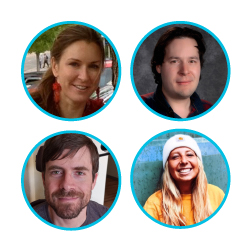
Featured Speakers
Tuesday, July 27 • 2:45–3:30 PM EDT
A Space for STEAM: Scientific Illustration with the Denver Museum of Nature & Science
Taliah Farnsworth
Virtual School Programs Coordinator, Denver Museum of Nature & Science
Jose Zuniga
Educator/Performer, Denver Museum of Nature & Science
No space suit, helmet, or rocket required for this trip into our solar system! Take a virtual journey to Saturn's largest moon, Titan, and take your first steps to becoming a scientific illustrator. Science and art both play important roles in how we understand our complex world. Art can also provide a valuable access point to STEM content for students who do not identify as "scientists."
In this fun, interactive session, get a taste of a Virtual Science Academy program from the Denver Museum of Nature & Science and create your own scientific illustration. Join us to explore why methane rains from Titan’s sky and why the atmosphere is bright orange, and discover new resources for STEAM learning.
Note: Participants will need one piece of orange paper, one black-colored pencil, and one white-colored pencil, or similar materials to actively engage in this session.
Taliah Farnsworth
Taliah Farnsworth is celebrating 10 years at the Denver Museum of Nature & Science, where she leads the Museum's virtual school programming suite, including award-winning Virtual Science Academy suite and Scientists in Action broadcast series. Taliah is most excited by people, science, and any opportunity to put the two together, especially if it involves getting her hands dirty. She holds a BA in Cognitive Neuroscience from the University of Denver and a MA of Teaching in Biology from Miami University (Ohio).
Jose Zuniga
Jose Zuniga has been an informal science educator and performer at the Denver Museum of Nature & Science for the last 11 years. Over that time, he has helped develop programing and curricula for many exhibits, ECE audiences, and the planetarium as well as performing live countless times for both students and museum guests.
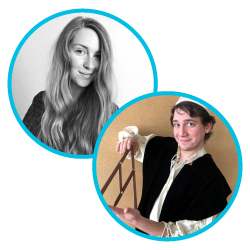
Thursday, July 29 • 11:45 AM–12:30 PM EDT
STEM in a Sociocultural Context
Dana L. Zeidler
Distinguished University Professor of Science Education, University of South Florida, Tampa
The use of socio-scientific issues as contexts for learning science, as well invoking cross-disciplinary connections, is supported in the literature as being both effective and educationally significant. STEM mandates and programs often lack this “Science-in-Context” vision. This talk aims to situate the teaching and learning of science from a sociocultural perspective of STEM, such that the need for learning it is apparent and the content being learned relevant, meaningful, and useful.
Dr. Dana L. Zeidler
Dr. Dana L. Zeidler (PhD, MS, BS, AAS) is the Distinguished University Professor of Science Education in the College of Education at the University of South Florida, Tampa. He has developed an international research program in the field of science education centered on socio-scientific issues, taking a sociocultural approach to teaching and learning about how moral and ethical issues can be a means to foster the formation of epistemological sophistication and character in the pursuit of scientific literacy. His work has been cited over 12,000 times in international literature (Goggle Scholar). Professor Zeidler’s recent distinctions include serving as co-editor of the Journal of Research in Science Teaching; receiving the Distinguished Career Award from NARST: A Worldwide Organization for Improving Science Teaching and Learning Through Research; past president of NARST; Distinguished Visiting Professor of Science Education at Ewha Womans University, Seoul, South Korea; Honorary Professor of Science and Environmental Studies at The Hong Kong Institute of Education, The University of Hong Kong; and an Honorary Professor of Science Education at Beijing Normal University. Dr. Zeidler works closely with doctoral students, international scholars, and other leaders in the field.
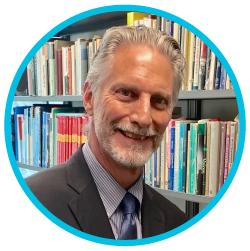
Thursday, July 29 • 12:45–1:30 PM EDT
Using the Zoo as a Living Laboratory
Grace Fuller
Director of Animal Welfare, Detroit Zoological Society
Participants will be introduced to the ways you can use your local zoo as a living laboratory to teach STEM content to majors and nonmajors alike. During this interactive session, participants will explore the various ways science is used at the zoo and practice collecting behavioral data.
Grace Fuller
Grace Fuller is director of Animal Welfare for the Detroit Zoological Society (DZS) at the Center for Zoo and Aquarium Animal Welfare and Ethics (CZAAWE). She oversees the Zoo’s welfare assessment programs and scientific research, training and enrichment programs, and educational initiatives, including an online resource center and animal welfare workshops for animal care professionals. Grace joined the DZS in 2014 as the manager of applied animal welfare science in CZAAWE. In that role, she oversaw behavioral research and monitoring efforts, in addition to developing an on-site endocrinology laboratory and program. Before coming to the DZS, she completed a PhD in biology at Case Western Reserve University in Cleveland as part of a unique research partnership with Cleveland Metroparks Zoo. Grace studied lighting design for nocturnal primates in captivity for her dissertation. She also completed a post-doc in Indonesia studying the evolutionary ecology of venom in slow lorises. During this time, she conducted a series of studies on the welfare of slow lorises living in sanctuaries after being rescued from the illegal wildlife trade. Grace loves applying science to real-world problems that contribute to improving the lives of captive animals.
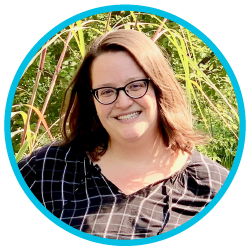
Thursday, July 29 • 1:45–2:30 PM EDT
Why DIY Cultural Responsiveness: The Science of Effective Cultural Responsiveness
Courtney Plotts
Author, Online School Psychologist, Professor, and National Chair, Council for At Risk Student Education and Professional Standards
This interactive workshop will demonstrate the pitfalls and barriers to cultural responsiveness. Participants will gain knowledge and applicable skills in cultural responsiveness that are small changes to what they are currently doing in their professional practice.
Courtney Plotts
Dr. Courtney Plotts is a licensed and certified school psychologist who writes and speaks about culturally responsive teaching and community building. She has written two books on Latino/a and Black culture and online spaces. She is currently the National Chair of the Council for At Risk Student Education and Professional Standards. She has been recognized by the California State Legislature for a bold commitment to change and education. Dr. Plotts offers workshops on topics related to building community and culture in online spaces, effective culturally responsive teaching, and best practices. She was also highlighted in Flower Darby's book Small Teaching Online regarding student culture and online spaces. Currently, she is providing professional development on cultural responsiveness as an academic system of measured support.
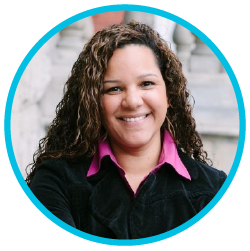
Friday, July 30 • 1:45–2:30 PM EDT
In the Room Where It Happens: K–12 STEM Teachers Share Their Journeys, Discoveries, and Experiences with the Federal STEM Strategic Plan and Other National STEM Education Efforts
Moderator: Dr. Monya Ruffin-Nash
Strand Leader for STEM Ecosystems, NSTA STEM21, and Program Director, Directorate for Education and Human Resources, National Science Foundation
The Albert Einstein Distinguished Educator Fellowship (AEF) Program provides a unique opportunity for K–12 STEM teachers to serve and contribute to education at the national level. In this panel session, five Albert Einstein Distinguished Educator Fellows will share their learning journeys and experiences. During the 2020–2021 school year, with support from their administrators, they left their classrooms to spend the year working on various STEM education projects and programs with the U.S. Department of Defense, U.S. Department of Energy, and U.S. Department of the Interior. Given their extensive expertise in K–12 STEM teaching and leadership, they were invited to join one or more of the five Federal Interagency Working Groups to create and implement recommendations from the five-year strategic plan: Charting a Course for Success: America’s Strategy for STEM Education. Through an interactive panel discussion, session participants will learn more about the Fellowship, personal pathways of the educators, the Federal STEM Education Strategic Plan, and the relevancy and potential impact of this work on education.
Dr. Monya Ruffin-Nash
Dr. Monya A. Ruffin-Nash is a program director at the National Science Foundation in the Directorate for Education and Human Resources in the Division for Research on Learning in Formal and Informal Settings. During her tenure, she has served as a program officer for several NSF programs and initiatives. In her fifth year, she accepted a position as senior scientist at Emory University and director of Education, Outreach, and Diversity for a large Center for Chemical Innovation funded by the National Science Foundation. In this role, Dr. Ruffin-Nash directed, managed, and oversaw education, outreach, and diversity initiatives and teams across the 23 chemical research laboratories across the country. She has been a member of the National Science Teaching Association for over 25 years. She began her STEM education career as a high school science educator in Georgia and she has also taught at the graduate level. Dr. Ruffin-Nash has a BS in Biology, an MEd in Secondary Science Education (Biology), and a PhD in Teaching and Learning with emphases in Science Education and Education Technology. She also currently holds a valid science teaching license (grades 7–12).
Laura Larkin
Laura Larkin is an Albert Einstein Distinguished Educator Fellow at the Department of Defense in the Office of the Undersecretary of Defense, Research & Engineering STEM Office for the 20/21 and 21/22 cohorts. She serves on the Interagency Working Group (IWG) for Computational Literacy and is the executive secretary for the IWG–Inclusion in STEM. She assists the DoD STEM office in overseeing K–16 STEM education activities, outreach, and workforce development. Laura has taught all levels of mathematics at a diverse Title 1 comprehensive high school for 18 years in Redwood City, California. She served as the department chair, founded and coached the award-winning robotics team, mentored several teacher candidates, and chaired the school site council. Prior to her teaching career, Laura was a mechanical engineer in the aerospace field. Laura is passionate about promoting equity in access and equity in outcomes for all students. Her position at DoD STEM aligns with her goals of inspiring underserved students to pursue STEM careers.
Dr. Kama Almasi
Dr. Kama Almasi is a high school and middle school science and math educator with Lincoln County Public Schools on the central Oregon Coast. She is currently serving as an Albert Einstein Distinguished Educator Fellow with the U.S. Geological Survey (USGS) in Reston, Virginia, where she is writing science curricula and working on equity issues in education. After teaching Ecology and Biology at the University of Wisconsin, Stevens Point for five years, Kama became a K–12 teacher in 2008 to better address the needs for diversity and equity in STEM fields and because she enjoys working with teenagers. Kama’s teaching philosophy is that math and science education should be culturally and personally relevant to students and centered around inquiry and project-based learning.
Kelly Day
Kelly Day is the Albert Einstein Distinguished Educator Fellow at the Department of Energy for the 20/21 and 21/22 cohorts. During her time serving as an Einstein Fellow, Kelly sits on The Interagency Working Group for Convergence education and helps run the DOE-sponsored National Science Bowl. Prior to her AEF placement at the DOE, she spent 11 years teaching seventh-grade mathematics at Westfield Middle School in Westfield, Indiana. In 2015, Kelly received the Fulbright Distinguished Award in Teaching, which allowed her to spend five months living in Finland where she researched Finnish education policy as well as female achievement in mathematics at the University of Helsinki. In 2013, Kelly received an Eli Lilly Endowment Teacher Creativity Grant that funded her independent research on Asian Education Systems and allowed her to observe education systems in seven different Asian nations. In 2017 she served as a Teach Plus Policy Fellow where she worked with legislators on Indiana education reform and sat on a House committee that helped develop the ESSA-based school accountability system for Indiana. Kelly is a dedicated teacher and a passionate advocate for quality education for children around the world.
Suzy Otto
Suzy Otto spent 17 years as a physics and chemistry teacher and STEAM coordinator at Paris High School in the rural community of Paris, Missouri. She is a second career teacher with a Bachelor’s degree in Chemical Engineering from the University of Missouri–Rolla and nine years of petroleum industry engineering experience. Making the decision to become a teacher led Suzy to the University of Missouri–Columbia, where she obtained teaching credentials and a Master’s degree in Science Education Curriculum and Instruction. She brought her engineering experiences into the classroom, providing real-world applications in science lessons and exposing her rural students to some of the college and career opportunities that a STEM education can provide. As a 2020–2021 Einstein Fellow, Suzy served with the Department of Defense in the STEM and Outreach Team at the Naval Surface Warfare Center Carderock Division, where she supported student internship programs, participated in wide-ranging professional development experiences, and developed a STEM-in-a-Box program to bring hands-on, Naval-relevant activities into classrooms across the D.C.-Maryland-Virginia region that Carderock serves.
Mike Vargas
Mike Vargas is a high school physics teacher from Phoenix, Arizona. He is currently serving as an Albert Einstein Distinguished Educator Fellow in the Office of the Undersecretary of Defense for Manufacturing Technology. Mike was the Arizona High School Science Teacher of the Year, an Arizona Teacher of the Year Ambassador for Excellence, and the 2019 Rolls Royce Air Force Association-National Aerospace Teacher of the Year. Mike’s background is in STEM education public policy and he has served as an AAPT/AIP Master Teacher Public Policy Fellow Advisor as well as a member of the Arizona Cactus Caucus. He is a proponent of Physics First and lifetime member of the American Modeling Teachers Association.
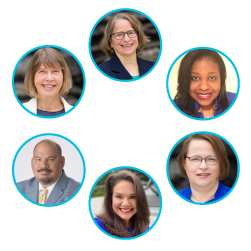
Friday, July 30 • 11:45 AM–12:30 PM
Shell-Sponsored Featured Panel: Overcoming the Challenges of Delivering STEM to All Students
Sponsoring Company: Shell
Moderator: Melissa Collins
Elementary Teacher, John P. Freeman Optional School, Memphis, TN
A panel of current Shell Urban Educators Development Award winners will discuss their successes and challenges with implementing a STEM curriculum to an underserved and underrepresented student population. They provide strategies, methods, and programs that address inequities while ensuring STEM is for all students.
Melissa Collins
Melissa Collins has been an elementary school teacher at John P. Freeman Optional School for 21 years, where she is constantly amazed by her students’ curiosity about the world around them. Melissa has mentored several teachers through the National Board process. She is the recipient of several awards and honors, including the 2020 National Teacher Hall of Fame Inductee, the Presidential Award for Excellence in Mathematics and Science Teaching, the National Science Teaching Association Sylvia Shugrue Award, the West Tennessee Teacher of the Year, and many more. She is a proud National Board Certified Teacher in the area of Early Childhood Education and serves as a board member on the National Board Professional Teaching Standards. Also, she serves on the National Science Foundation EHR Advisory Board Committee.
Alexander Eden
Alexander Eden teaches high school biology in an urban school district to a diverse population of 10th graders who speak many different languages. Whenever he enters the classroom, whether in-person or virtually, he enters ready to create an environment where students feel appreciated. They leave knowing that they have a voice, they can be themselves, and science is fun. Informal science education experiences that have shaped his teaching include being an overnight instructor at the Boston Museum of Science, an environmental educator for Mass Audubon, and a research technician in a neuroscience lab at an R1 research institution.
Michelle Ellis
As a science teacher, Michelle Ellis wants to create a sense of wonder in her students, making connections with the world around them. As part of the North Carolina Department of Public Instruction (NCDPI), Michelle was on the curriculum unit writing team that supported North Carolina science teachers. Her work with NCDPI has continued over the years, which has led to more formal opportunities through committee and executive board appointments at the local level with the North Carolina Science Teachers Association and the North Carolina Science Leadership Association.
Carla Neely
Carla Neely taught elementary students for 19 years and was responsible for teaching all subjects. Because she had only a small block of time to teach science, she integrated science across all subjects, which showed students that science is in everything that they see and do. In 2019, Carla became the fourth- and fifth-grade science teacher at an African American all-girls school. She began that school year with two goals in mind: creating a STEM-based science classroom and showing students that African American women work in STEM. With the help of professional development, grants, speakers, and field trips, Neely continues to achieve both goals.
LaShan Rose
The first thing LaShan Rose teaches her students is that they are all scientists with scientific minds learning about the world around them. In 2013, LaShan completed the Riverbend Environmental Center Summer Science Institute, learning how to teach inquiry science in the classroom in fun, interactive ways. She incorporated reading and math into her science lessons, and she became the school science teacher after she suggested this change to her administration. She continued to work with Riverbend for two more summers and completed their fellowship program, which allowed her to learn about Aquaponics and to bring an Aquaponics tank to the school.
Mike Vargas
Mike Vargas is a high school physics teacher from Phoenix, Arizona. He is currently serving as an Albert Einstein Distinguished Educator Fellow in the Office of the Undersecretary of Defense for Manufacturing Technology. Mike was the Arizona High School Science Teacher of the Year, an Arizona Teacher of the Year Ambassador for Excellence, and the 2019 Rolls Royce Air Force Association-National Aerospace Teacher of the Year. Mike’s background is in STEM education public policy and he has served as an AAPT/AIP Master Teacher Public Policy Fellow Advisor as well as a member of the Arizona Cactus Caucus. He is a proponent of Physics First and lifetime member of the American Modeling Teachers Association.
Cenia Santana
Cenia Santana has three NYS certifications in TESOL, Bilingual, and Biology 7–12 and currently teaches numerous areas of science, such as applied physics, biology, anatomy, and physiology. Her career highlights include over nine years’ experience working with English Language Learners, receiving more than five fellowships and numerous grants, and being the 2019 winner of the Shell Urban Development Award for Science Teachers. As a fellow for Columbia University’s summer research program, Cenia has presented research in the Murdock Trust Fund’s Partners in Science National Conference.
Tiffany Scott
Tiffany Scott’s opportunities for science professional development have been limited; however, she has attended sessions at the state's Teacher Leaders Conference in June 2019 and the 2018 NSTA STEM Forum & Expo. At these conferences, she participated in sessions that strengthened her knowledge of implementing the NGSS and equipped her with more confidence to facilitate meaningful student-led discussions where students make claims and effectively support them with evidence from class investigations.
Erica Stephens
Erica Stephens makes it a point to implement STEM in her elementary classroom, researching and learning what she should do in the classroom for her urban students. She engages students in inquiry-based learning, the scientific method, and the engineering design process. During the exposure in the classroom, Erica showcases different career options that encompass the work her students enjoy in class. At her school, she also helped implement a STEM Club for students.
John Carlo Tulinao
John Carlo Tulinao has been teaching science, arts, and cultural education in the elementary grades for almost 10 years. He focuses on building connections between science, culture, arts, and daily life experiences. John Carlo’s goal is to make the student understand that STEAM concepts should not be learned separately, but rather, these concepts are interconnected. When Tulinao moved to the United States in 2017, he taught a first-grade class of students with diverse cultural backgrounds and he created a STEAM program that would be relevant to his multicultural classroom and reflect the uniqueness of each culture.
Leslie White
After finishing up course work for a biomedical sciences doctorate program, Leslie White did a rotation focusing on chronic kidney disease where she discovered her love for teaching youth. She taught a short course on Anatomy and Physiology to honors high school students, which solidified her interest in teaching. Leslie was named 2019–2020 Teacher of the Year at her school and was a top five finalist overall for Duval County in 2020. She transitioned to the position of Secondary Science Curriculum Specialist and Coach for her district and is the science specialist for four schools.
Nakia Williams
Nakia Williams is a third-grade science and math teacher who has taught science for the past seven years, using the Science Dimension curriculum the last three years. Nakia loves making her science lessons hands-on learning experiences that are cognitively challenging, collaborative, and fun. She wants her love for science to shine through, which will help inspire interest in her students. She always strives to build her bank of subject material and stay on top of the latest research, which help make her science lessons come alive.

Friday, July 30 • 12:45–1:30 PM EDT
Principles for Equitable Learning Post Pandemic
Moderator: William Penuel
Distinguished Professor of Learning Sciences and Human Development, University of Colorado Boulder
The pandemic has reminded us that learning demands strong teacher-student relationships and opportunities to connect ideas from science to students’ and families’ everyday lives and communities. Equity demands we not return to the “old normal” and that we reject the false dichotomy between learning and students’ social, cultural, emotional, and intellectual well-being. In this panel presentation, authors of the Learning Policy Institute and Spencer Foundation report “Summer Learning and Beyond: Principles for Equitable Learning Postpandemic” will describe principles grounded in the learning sciences for equitable learning in a post-pandemic world.
William Penuel
Bill Penuel is Distinguished Professor of Learning Sciences and Human Development in the Institute of Cognitive Science and School of Education at University of Colorado Boulder. He works in partnership with community organizations, school districts, and state agencies to promote equity and justice in science education.
Shirin Vossoughi
Shirin Vossoughi is an associate professor of Learning Sciences at Northwestern University’s School of Education and Social Policy, where she draws on ethnographic and interactional methods to study the cultural, sociopolitical, and ethical dimensions of human learning. Her research centers on hybrid learning environments that blend formal and informal elements and support young people to develop, question, and expand disciplinary and artistic knowledge in ways that nourish educational self-determination. Shirin’s current work looks closely at teaching and learning in making/STEAM environments (elementary and middle school students), and examines the role of written feedback on student writing in the context of political education (high school and college students). She has taught in schools and after-school and summer programs, and has served as director of a summer camp for youth in the Iranian diaspora. She takes a collaborative approach to research, partnering with teachers, families, and students to co-design and study the conditions that foster educational dignity and possibility.
Christopher Collins
Chris Collins started his career as a middle school math teacher in Cajon Valley School District, working to excite students about a future in math and science. He now works as a Teacher Coach with the World of Work program in Cajon Valley. Chris spends his time coaching teachers and writing curricula to help show every student that they have unique strengths, interests, and values and a dream job they are perfectly suited for.
Ann Ishimaru
Dr. Ann M. Ishimaru is an associate professor of Educational Policy, Organizations, and Leadership at the University of Washington’s College of Education. In her scholarship, she partners with minoritized families and communities as well as systems leaders to codesign educational justice and community well-being in preK–12 education. Ann received the 2017 AERA Exemplary Contributions to Practice-Engaged Research Award, has published numerous peer-reviewed journal articles, and recently published the book Just Schools: Building Equitable Collaborations with Families and Communities with Teachers College Press.
